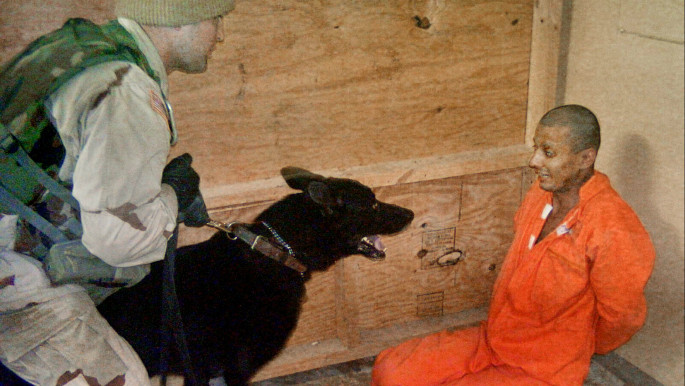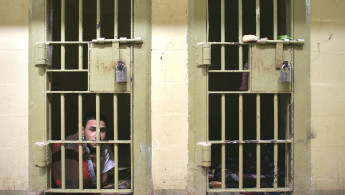Iraqi voices: inside the gulags of US occupation
These questions posed by Iraqi lawyer, Amal Sawadi, at the World Tribunal on Iraq in 2005 paint a picture of arbitrary arrest, imprisonment and systematic torture of Iraqi civilians at the hands of US forces during the occupation.
| All Iraqi land has turned into a prison... Amal Sawadi, Iraqi lawyer 2005 |
"All Iraqi land has turned into a prison. Even a 10-year-old child can be arrested," Sawadi said.
During the war in Iraq, US troops and CIA agents committed a series of human rights violations against prisoners at the Abu Ghraib prison - physical and sexual abuse, torture, rape, murder.
The abuses came to light with reports published in late 2003 by Amnesty International and the Associated Press.
Photographs were leaked of prisoners on leashes, dog attacks and sexual humiliation.
 |
|
| An Iraqi man is threatened inside Abu Ghraib prison. [Getty] |
The 2005 World Tribunal on Iraq published a shocking testimony from a 46-year-old engineer. He said:
"I saw a young man of 14 bleeding from his anus and lying on the floor. He was Kurdish and his name was Hama. I heard the soldiers talking to each other about this guy; they mentioned that the reason for this bleeding was inserting a metal object in his anus. I suspected that this was caused by a sexual assault but could not confirm it."
The organisation also spoke to an agricultural engineer: "They advanced the chair I was sitting on very close to a wood fire that they lit, which left burns on my leg.
"They inserted some strange objects into my anus and asked me to take very humiliating positions while they messed with me and moved these objects in different directions.
"They were calling these positions some names, which I did not understand. They took many photos while I was in these positions, they were laughing and enjoying it.
"There was also a male and a female soldier who sat behind me; they were messing with each other.
"Their game was that the male soldier would aim at my injured and swollen leg with a piece of rock, as soon as he hit his target and I screamed in pain she would reward him by letting him kiss her or fondle her.
"The stronger my pain was and the louder my scream was, the more he would get from her."
|
|
||
| Iraq - Lifting the Hood, Journeyman Pictures |
Kifah Taha al-Mutari, another imprisoned Iraqi man, gave evidence during a High Court case on 14 December 2004 about the death and torture of his colleague, Baha Mousa, while in prison.
"Baha appeared to have much worse treatment than the others. Two or more soldiers would beat him at a time whereas the rest of us were beaten by one soldier.
"Baha may have been punished more than the others in an act of revenge. His father, who witnessed the arrest, had informed the officer in charge that he had seen the soldiers stealing money from the hotel.
"Baha was taken into another room and received more beatings. He was not able to stand up and the soldiers continued beating him while he was on the floor. The soldiers used sharp jabbing movements into the area beneath the ribs, which was particularly painful.
"On the third night Baha was in a separate room and I could hear him moaning through the walls. He was saying that he was bleeding from his nose and that he was dying. I heard him say, 'I am dying'. I heard nothing further from him after that."
Mutari told his interviewer what he also experienced.
"Soldiers took turns in abusing us, at night the number of soldiers increased, sometimes up to eight at a time.
"One terrible game the soldiers played involved kickboxing. The soldiers would surround us and compete as to who could kick box one of us the furthest. The idea was to try and make us crash into the wall."
Lawyer, Amal Sawadi, gave more of an insight to the 'procedure' of arrests:
"First of all, they are imprisoned without any legal justification. Sometimes they use Iraqi police for capturing people - they come to the house and enter in the middle of the night, at 2am or 3am, when everybody is asleep.
"They use explosives to break down the doors, then the soldiers enter the house and they point their guns at everybody in the house.
"The Americans tie people's hands and then put women on one side, the children on another and the men at another corner.
"They search women in front of their fathers. They don't ask their permission although they know that Iraqi women are sensitive about these issues. They don't even let women put on their veils.
"Sacks are placed on the heads of the people who are to be taken away while their hands remain tied.
"When it's a woman, they tie the hands and the feet. Then they put everybody in a vehicle, piling people up without any respect. When they leave the house, the doors are left open to help thieves rob the place.
"Then the investigation starts. Actually, what they are investigating is ambiguous. There are no lawyers allowed for the detainees and no information is given about the reason or the evidence surrounding the detentions."
Baghdad prison life - pay or get in the hole
| Soldiers took turns in abusing us, at night the number of soldiers increased |
Salem Ismael, a doctor who was in Fallujah in February 2005, where he was delivering aid as well as photographing and interviewing civilians, told the story of Fallujah resident Hudda Fawzi Salam Issawi. She said:
"Five of us, including a 55-year-old neighbour, were trapped together in our house in Falluja when the siege began.
"On 9 November, American Marines came to our house. My father and the neighbour went to the door to meet them. We were not fighters. We thought we had nothing to fear.
"I ran into the kitchen to put on my veil, since men were going to enter our house and it would be wrong for them to see me with my hair uncovered.
"This saved my life. As my father and neighbour approached the door, the Americans opened fire on them. They died instantly.
"Me and my 13-year-old brother hid in the kitchen behind the fridge. The soldiers came into the house and caught my oldest sister. They beat her. Then they shot her. But they did not see me.
"Soon they left, but not before they had destroyed our furniture and stolen the money from my fathers pocket."
"This is the situation of Iraq today" Sawadi summed up in 2005 - sadly, little has changed in Iraq today in 2015.



